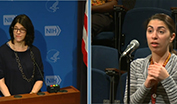-
- NIH VideoCast - Loss of Type I Interferon Negative Regulation ??? Lessons from Human Genetics
-
- - Dusan Bogunovic, Ph.D., Assistant Professor, Department of Microbiology, Department of Pediatrics, Mindich Child Health and Development Institute, Icahn School of Medicine, Mount Sinai, New York (2017/11/10)
- - Category : Immunology
- Immunonology IG Seminar
Dr. Dusan Bogunovic is an Assistant Professor in the Department of Microbiology, Department of Pediatrics at Mindich Child Health and Development Institute at the Icahn School of Medicine at Mount Sinai in New York. He obtained his PhD in Immunology at NYU Medical School where he studied innate immune signaling in dendritic cells as a function of their ability to mount an adaptive immune response against melanoma. That work has inspired two clinical trials. He did his postdoctoral fellowship at The Rockefeller University with Jean-Laurent Casanova where he studied how host genetics contribute to infection susceptibility. Subsequently, after starting his own lab, his group defined an essential role for free intracellular ISG15 and USP18 in regulation of Type I Interferon-induced inflammation (Nature, 2015), and identified USP18-deficient individuals and detailed the molecular mechanisms underlying their Type I IFN-mediated inflammation (JEM, 2016). More recently, his group discovered that ISG15-deficient individuals have augmented anti-viral responses (Nature Commun, 2016). This discovery, which is now followed up by the Bogunovic lab in developing ISG15 inhibitors as broad-spectrum antivirals, was included in the "top ten discoveries with the potential to change the world" by Scientific American and lead him serve as an advisor to Mr. Bill Gates on the current state of antivirals in 2017. Dr. Bogunovic has received several awards including the 2015 Milstein Award for Young Investigators by the International Cytokine and Interferon Society, the 2016 Young Investigator Award by the American Society for Microbiology and the 2017 Lamport Research Award by Icahn School of Medicine at Mount Sinai. Dr. Bogunovic???s talk will outline his research interests, which encompass human immunogenetics in the context of infectious, inflammatory, and neoplastic diseases, and type I IFN-mediated inflammation.
NIH VideoCast - Loss of Type I Interferon Negative Regulation ??? Lessons from Human Genetics
-
- NIH VideoCast - Task Force on Research Specific to Pregnant Women and Lactating Women (Day 2)
-
- - NICHD, NIH (2017/11/09)
- - Category : Conferences
- The 21st Century Cures Act established the Task Force on Research Related to Pregnant Women and Lactating Women (PRGLAC) to advise the Secretary of Health and Human Services regarding gaps in knowledge and research on safe and effective therapies for pregnant women and lactating women. PRGLAC is tasked with identifying these gaps and will report its findings back to the Secretary.
Federal members include the Directors of NIH, NICHD, the Centers for Disease Control and Prevention, the Office on Women`s Health, and the National Vaccine Program Office, as well as the Commissioner of Food and Drugs. Non-federal members include representatives from relevant professional societies, nonprofit organizations, and industry.
NIH VideoCast - Task Force on Research Specific to Pregnant Women and Lactating Women (Day 2)
-
- NIH VideoCast - IEEE-NIH 2017 Special Topics Conference on Healthcare Innovations and Point-of-Care Technologies (Day 2)
-
- - NIH (2017/11/09)
- - Category : Conferences
- The special topic conference will focus on healthcare innovations and point-of-care technologies for precision health and their clinical translation to address challenges in quality global healthcare. The conference will provide an international forum with clinicians, healthcare providers, industry experts, innovators, policy professionals, researchers and students to define clinical needs and technology solutions towards commercialization and translation to clinical applications across different environments and infrastructures. Panel discussions and open forum sessions along with research presentations will focus on the development, clinical translational, commercialization, implementation and user-compliance of innovative healthcare and point-of-care technologies in clinical (hospital, emergency, acute, chronic and primary care), non-traditional (consumer) and under-resourced settings.
For more information go to https://hipt.embs.org/2017
NIH VideoCast - IEEE-NIH 2017 Special Topics Conference on Healthcare Innovations and Point-of-Care Technologies (Day 2)
-
- NIH VideoCast - Alternative Test Methods to Reduce Vertebrate Animal Testing under the Toxic Substances Control Act (TSCA)
-
- - NIEHS, NIH & EPA (2017/11/08)
- - Category : Advisory Board Meetings and Workshops
- Interagency Coordinating Committee on the Validation of Alternative Methods
The Frank R. Lautenberg Chemical Safety for the 21st Century Act amended Section 4(h) of the Toxic Substances Control Act (TSCA) to require EPA to develop a Strategic Plan by June 22, 2018 to promote the development and implementation of alternative test methods and strategies to reduce, refine or replace vertebrate animal testing. EPA is holding this public meeting to obtain input from interested parties and the public on the Agency`s development of the Strategic Plan. EPA believes this early feedback will be important in developing a strong Strategic Plan. Goals and objectives to inform the Strategic Plan and that can be used for discussion and comment are available at http://www.epa.gov/assessing-and-managing-chemicals-under-tsca/alternative-test-methods-and-strategies-reduce. Interested parties may provide input about the draft Strategic Plan during the meeting. Additionally, written comments may be submitted to docket EPA-HQ-OPPT-2017-0559 at www.regulations.gov and must be received no later than 60 days following the meeting. The Agency will consider input from the meeting and from written comments to develop a draft Strategic Plan that will be shared with the public for comment.
NIH VideoCast - Alternative Test Methods to Reduce Vertebrate Animal Testing under the Toxic Substances Control Act (TSCA)
-
- NIH VideoCast - Task Force on Research Specific to Pregnant Women and Lactating Women (Day 1)
-
- - NICHD, NIH (2017/11/08)
- - Category : Conferences
- The 21st Century Cures Act established the Task Force on Research Related to Pregnant Women and Lactating Women (PRGLAC) to advise the Secretary of Health and Human Services regarding gaps in knowledge and research on safe and effective therapies for pregnant women and lactating women. PRGLAC is tasked with identifying these gaps and will report its findings back to the Secretary.
Federal members include the Directors of NIH, NICHD, the Centers for Disease Control and Prevention, the Office on Women`s Health, and the National Vaccine Program Office, as well as the Commissioner of Food and Drugs. Non-federal members include representatives from relevant professional societies, nonprofit organizations, and industry.
NIH VideoCast - Task Force on Research Specific to Pregnant Women and Lactating Women (Day 1)
-
- NIH VideoCast - IEEE-NIH 2017 Special Topics Conference on Healthcare Innovations and Point-of-Care Technologies (Day 1)
-
- - NIH (2017/11/08)
- - Category : Conferences
- The special topic conference will focus on healthcare innovations and point-of-care technologies for precision health and their clinical translation to address challenges in quality global healthcare. The conference will provide an international forum with clinicians, healthcare providers, industry experts, innovators, policy professionals, researchers and students to define clinical needs and technology solutions towards commercialization and translation to clinical applications across different environments and infrastructures. Panel discussions and open forum sessions along with research presentations will focus on the development, clinical translational, commercialization, implementation and user-compliance of innovative healthcare and point-of-care technologies in clinical (hospital, emergency, acute, chronic and primary care), non-traditional (consumer) and under-resourced settings.
For more information go to https://hipt.embs.org/2017
NIH VideoCast - IEEE-NIH 2017 Special Topics Conference on Healthcare Innovations and Point-of-Care Technologies (Day 1)
-
- NIH VideoCast - TRACO 2017: Genomics and Lymphoma
-
- - Dr. Jun Wei, NCI, NIH and Dr. Kieron Dunleavy, NCI, NIH (2017/11/08)
- - Category : TRACO
- Translational Research in Clinical Oncology (TRACO)
Recent advances in understanding cancer biology are beginning to be translated into improvements in diagnosis and treatment of cancer. In the post-genome era, we increasingly rely on strong collaboration between basic and clinical scientists to develop novel approaches for treatment of human disease. The NCI Center for Cancer Research (CCR) is one of the largest cancer research organizations in the world, with more than 200 principal investigators, and has played a major role in developing and implementing many new technologies, such as nanotechnology, next generation sequencing, genomics and proteomics.
For more information go to http://ccr.cancer.gov/training/trainee-resources/courses-workshops/traco
NIH VideoCast - TRACO 2017: Genomics and Lymphoma
-
- NIH VideoCast - NCI Clinical Trials and Translational Research Advisory Committee (CTAC) - November 2017
-
- - Coordinating Center for Clinical Trials, NCI, NIH (2017/11/07)
- - Category : Clinical Trials and Translational Research
- The CTAC makes recommendations on the NCI-supported national clinical trials enterprise to build a strong scientific infrastructure by bringing together a broadly developed and engaged coalition of stakeholders involved in the clinical trial process.
For more information go to http://deainfo.nci.nih.gov/advisory/ctac/ctacmeetings.htm
NIH VideoCast - NCI Clinical Trials and Translational Research Advisory Committee (CTAC) - November 2017
-
- NIH VideoCast - Encoding and scaling pain through specific cell types
-
- - Patrik Ernfors, Ph.D., Karolinska Institute (2017/11/07)
- - Category : Neuroscience
- NIH Neuroscience Series Seminar
Two main directions of research are conducted in Dr. Ernfors group - understanding how complex sets of modality specific sensory neurons codes for somatic sensation and understanding the biology of glioblastoma.
The problem of pain continues to grow as population age, but there has been a difficulty to develop new useful analgesic drugs. Almost 1 in 5 of the population has an ongoing pain problem, with 7% suffering debilitating pain. Little remains known regarding the actual cellular and molecular complexity during pain transduction, simply because of lack of knowledge on the sensory neuron types conducting somatosensation and pain. A major focus of the lab is to determine the full cellular and molecular complexity of pain and unravel the critical cell types driving pain in particular types of pain disorders. For this purpose, they are using unbiased identification and classification of sensory cell types in rodents and non-human primates and exploit this knowledge to reveal their participation in acute, inflammatory and neuropathic pain using mouse genetics. Hence, the overall aim is to provide knowledge on the existence of defined types of nociceptive cells and assign their participation to particular types of pain states.
For more information go to https://neuroscience.nih.gov/neuroseries/Home.aspx
NIH VideoCast - Encoding and scaling pain through specific cell types
-
- NIH VideoCast - CC Grand Rounds: NIH Clinical Center Translational Pulmonary Arterial Hypertension (PAH) Program: (1) Combining Quality Patient Care with PAH Research (2) Targeting PAH Inflammation with Spironolactone: A New Paradigm for an Old Drug
-
- - Michael A. Solomon, MD, Staff Clinician, Critical Care Medicine Department, CC, NIH and Jason M. Elinoff, MD, Assistant Clinical Investigator, Critical Care Medicine Department, CC, NIH (2017/11/03)
- - Category : Clinical Center Grand Rounds
- CC Grand Rounds: NIH Clinical Center Translational Pulmonary Arterial Hypertension (PAH) Program: (1) Combining Quality Patient Care with PAH Research (2) Targeting PAH Inflammation with Spironolactone: A New Paradigm for an Old Drug
For more information go to http://www.cc.nih.gov/about/news/grcurrent.html
NIH VideoCast - CC Grand Rounds: NIH Clinical Center Translational Pulmonary Arterial Hypertension (PAH) Program: (1) Combining Quality Patient Care with PAH Research (2) Targeting PAH Inflammation with Spironolactone: A New Paradigm for an Old Drug
-
- NIH VideoCast - Transforming Electronic Health Records from Annoyances to Assistants: A Research Agenda for the Next Decade
-
- - Jim Cimino, MD., Director, Informatics Institute, University of Alabama at Birmingham School of Medicine (2017/11/03)
- - Category : Special
- NLM Informatics Lecture Series
Clinical informatics research, and before that, medical informatics research, has made great strides in developing tools to help clinicians improve clinical decision-making and patient care. Yet, electronic health records (EHR) systems today show little aptitude for even simple tasks, like retrieving relevant patient information, while suppressing that which is irrelevant. When bringing artificial intelligence to bear, the best EHRs seem to do is to overwhelm us with alerts that a clinician must override to take action. When the ???learning health system??? attempts to use data from these systems, it must rely on indirect methods, such as machine learning and natural language processing, to figure out what was actually going on with the patient. The advances that have been made to bring decision support into EHRs rely on formally represented ??? that is structured and coded ??? data, such as problem lists, laboratory results and medication lists. What???s missing is a formal representation of the clinical cognition of the patient???s situation: what we think is going on, what our goals are, what we are trying to do about it, and why we have chosen to do it that way. Adding such information to the EHR would enable informaticians to enhance their tools in ways that will improve situational awareness, reduce information overload, make decision support systems provide more relevant knowledge to clinicians, and enable clinical researchers to draw more solid inferences from observational data. Informatics research is needed to understand what needs to be captured, determine how it should be represented, design user interfaces to minimize the effort required, and develop tools that ultimately reduce the work of clinical documentation by reducing redundant data entry, anticipating and executing work plans, and improve the quality and efficiency of patient care. Dr. Cimino will provide illustrations of the formal representation and use of clinical cognition and present a roadmap for research, development and education toward that goal.
NIH VideoCast - Transforming Electronic Health Records from Annoyances to Assistants: A Research Agenda for the Next Decade
-
- NIH VideoCast - Site-Specific Glycopeptide Identification by Tandem Mass Spectrometry
-
- - Nathan Edwards, Ph.D., Department of Biochemistry and Molecular & Cellular Biology, Georgetown University Medical Center (2017/11/03)
- - Category : Proteomics
- Proteomics Interest Group Lecture
ProtIG is an NIH Special Interest Group (SIG) that organizes seminars and workshops in relevant areas of proteomics, including talks on separation and protein identification methods, determination of post-translational modifications, protein-protein interactions, and bioinformatics and data management.
NIH VideoCast - Site-Specific Glycopeptide Identification by Tandem Mass Spectrometry
-
- NIH VideoCast - Frederick National Laboratory Advisory Committee (FNLAC) - October 2017
-
- - NCI, NIH (2017/11/02)
- - Category : NCI Frederick Advisory Committee
- The 13th meeting of the Frederick National Laboratory Advisory Committee
NIH VideoCast - Frederick National Laboratory Advisory Committee (FNLAC) - October 2017
-
- NIH VideoCast - Ethical and Regulatory Aspects of Clinical Research Session 6: Ethical issues in International Research and Mock IRB
-
- - NIH Clinical Center Department of Bioethics (2017/11/02)
- - Category : Bioethics
- The Department of Bioethics offers this seven to eight week course annually each fall. The course is designed to provide an overview of the important issues in the ethics of human subject research for clinical investigators and others who participate in the conduct of research and is open to the entire NIH community as well as to those from outside NIH. Topics include the history of human subject research ethics, principles and guidelines, study design, subject recruitment, informed consent, and international research. The course is open to the entire NIH community as well as to those from outside NIH. The recommended textbook is Ethical and Regulatory Aspects of Clinical Research, edited by Emanuel et al (Johns Hopkins University Press). The course is taught by guest faculty and faculty members from the National Institutes of Health. This is a required academic program for Bioethics fellows.
NIH VideoCast - Ethical and Regulatory Aspects of Clinical Research Session 6: Ethical issues in International Research and Mock IRB
-
- NIH VideoCast - TRACO 2017: Epidemiology and Health disparities
-
- - Neil E. Caporaso, M.D., NCI, NIH and Brid M. Ryan, Ph.D., M.P.H., NCI, NIH (2017/11/01)
- - Category : TRACO
- Translational Research in Clinical Oncology (TRACO)
Recent advances in understanding cancer biology are beginning to be translated into improvements in diagnosis and treatment of cancer. In the post-genome era, we increasingly rely on strong collaboration between basic and clinical scientists to develop novel approaches for treatment of human disease. The NCI Center for Cancer Research (CCR) is one of the largest cancer research organizations in the world, with more than 200 principal investigators, and has played a major role in developing and implementing many new technologies, such as nanotechnology, next generation sequencing, genomics and proteomics.
For more information go to http://ccr.cancer.gov/training/trainee-resources/courses-workshops/traco
NIH VideoCast - TRACO 2017: Epidemiology and Health disparities
-
- NIH VideoCast - Sex as a Biological Variable (SABV) Workshop (Day 2)
-
- - ORWH and OSC/Common Fund (2017/10/31)
- - Category : Conferences
- ORWH and OSC/Common Fund are presenting the SABV Workshop. The day-and-a-half-long workshop will include speakers who were supported through the ORWH and the Common Fund to address sex differences in brain function and behavior, sex effect/interactions with external influences, sex differences in animal models, and sex differences in gene expression. It will also include a panel discussion on accounting for SABV in research and design.
NIH VideoCast - Sex as a Biological Variable (SABV) Workshop (Day 2)
-
- NIH VideoCast - Ion Channels in Mammalian Primary Cilia
-
- - David Clapham, M.D., Ph.D., Howard Hughes Medical Institute (2017/10/31)
- - Category : Neuroscience
- NIH Neuroscience Series Seminar
The Clapham laboratory moved to the Janelia Research Campus in July 2017 and continued working on the ion channels and calcium signals. They have two major interests at present. First, they are interested in the ion channels in primary cilia and how they affect signaling pathways, such as Hedgehog, in embryonic and mature neurons and glia of the hippocampus. They are also pursuing the cryoEM structures of the two main channels of primary cilia so that they can understand their gating.
Second, Clapham lab is interested in understanding the two unusual ion channels, TRPM7 and TRPM6. These channels are in all cells, and when genetically deleted, are lethal. The channels are unique in that they possess active kinase domains that when cleaved, enter the nucleus and phosphorylate distinct residues on histones that control chromatin accessibility and thus transcription. Answering these questions will require electrophysiology, advanced light microscopy, mouse genetics, and structural approaches.
For more information go to https://neuroscience.nih.gov/neuroseries/Home.aspx
NIH VideoCast - Ion Channels in Mammalian Primary Cilia
-
- NIH VideoCast - Sex as a Biological Variable (SABV) Workshop (Day 1)
-
- - ORWH and OSC/Common Fund (2017/10/29)
- - Category : Conferences
- Office of Research on Women`s Health (ORWH) and Office of Strategic Coordination/Common Fund, (OSC)are presenting the SABV Workshop. The day-and-a-half-long workshop will include speakers who were supported through the ORWH and the Common Fund to address sex differences in brain function and behavior, sex effect/interactions with external influences, sex differences in animal models, and sex differences in gene expression. It will also include a panel discussion on accounting for SABV in research and design.
NIH VideoCast - Sex as a Biological Variable (SABV) Workshop (Day 1)
-
- NIH VideoCast - Ethical Issues in Research with Invasive and Non-Invasive Neural Devices in Humans
-
- - NIH Clinical Center Department of Bioethics and the NIH BRAIN Initiative (2017/10/29)
- - Category : Conferences
- This one-day workshop, organized by the NIH Clinical Center Department of Bioethics in association with the Neuroethics Division of the Multi Council Working Group of the NIH BRAIN Initiative, will consider ethical issues and practical approaches specific to research with invasive and non-invasive neural devices. The day will start with a brief overview of the state of the science with neural devices (session 1), followed by three sessions to discuss ethical challenges and solutions: risk and invasiveness, challenges in informed consent, and post-trial responsibilities. The goal of the workshop will be to draft points to consider on these topics for investigators, IRB members, and BRAIN Initiative program officers, as well as to identify areas where more research and guidance is needed.
For more information go to https://braininitiative.nih.gov/about/neuroethics.htm
NIH VideoCast - Ethical Issues in Research with Invasive and Non-Invasive Neural Devices in Humans
-
- NIH VideoCast - Learning to distinguish the good from the bad: Neural systems underlying reinforcement learning
-
- - Bruno Averbeck, Ph.D., Chief, Section on Learning and Decision Making (SLDM), Laboratory of Neuropsychology, NIMH, NIH (2017/10/29)
- - Category : NIH Director`s Seminars
- Director`s Seminar Series
The section on Learning and Decision making studies the neural circuitry and computational mechanisms that underlie reinforcement learning. Reinforcement learning (RL) is the behavioral process of learning what we like and do not like from experience. While some preferences are innate, many are learned over time. There are few areas in systems neuroscience where a theory has linked a neural mechanism to behavior as successfully as RL. The standard model of RL, developed in the mid-1990s, assumes that dopamine neurons code reward prediction errors (RPEs). RPEs are the difference between the reward that is received and the reward that was predicted. These dopaminergic RPEs are then communicated to the basal ganglia, specifically the striatum, because of its substantial dopamine innervation. The striatal neurons integrate RPEs to develop representations of the values of choices, i.e. our preferences. In contrast to the standard model we have recently shown that the amygdala, a structure in the medial temporal lobe, has a larger role in RL than the ventral striatum (VS). In addition, the role of the VS depends on the reward environment. When rewards are predictable, the VS has almost no role in learning whereas when rewards are less predictable the VS plays a larger role. These data outline a more specific role for the VS in RL than is attributed to it by current models. Given that the VS has been implicated in depression, particularly adolescent depression, this delineation of the contribution of the VS to normal behavior may help inform hypotheses about the mechanisms and circuitry underlying depression.
NIH VideoCast - Learning to distinguish the good from the bad: Neural systems underlying reinforcement learning






















